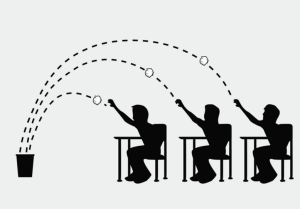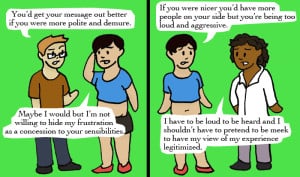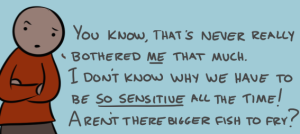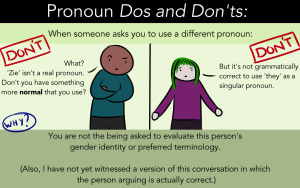
A person hides half of their face behind a transgender pride flag.
“Punishment is not something that happens to bad people. It happens to those who cannot stop it from happening. It is laundered pain, not a balancing of scales.” —Porpentine Charity Heartscape, “Hot Allostatic Load”
A few weeks ago, I saw it happen again: A trans woman I know was being publicly called out on the Internet.
The accusing post stated, without going into details, that she had spoken and acted in oppressive ways that had made other people feel unsafe. The post further demanded that people reblog the post, spread the word, and ban the trans woman in question from community spaces both online and IRL, as well as deny her opportunities for housing and job access within local queer informal networks.
Like most trans women I know, she was low-income and struggled with mental health, job security, and barriers to housing.
With a sinking feeling, I watched as the post rippled out through social media: Over the course of the day, it popped up in my online spaces over and over again, without much discussion attached. The woman herself said little in response.
I wasn’t sure how to feel, or how to react. I tried talking about the situation with some mutual acquaintances in the “social justice” community, but none of them seemed to feel sure about what to do or think either.
Certainly it didn’t help that this particular trans woman already had a “bad reputation” – for taking up too much space, for holding contentious opinions, and for being emotionally unstable in community spaces.
And while that painful, uneasy feeling continued to gnaw away at me, on the other hand, I didn’t want to play “devil’s advocate” to try and excuse oppressive behavior, did I? I didn’t want to gaslight the individuals who had felt personally attacked or harmed by this person, right by denying their experiences, right?
I wanted my community to be as safe and oppression-free as possible, didn’t I?
And if that meant forcing this “problematic” trans woman out of it, wasn’t that a reasonable price to pay? What other option was there?
It’s kind of scary to say this, but sometimes it feels like social justice activist culture creates as many problems as it tries to solve. Or maybe it’s just that our solutions, created as they are in reaction to an oppressive society, end up mimicking oppressive systems more often than we’d care to admit.
But whether we want to admit it or not, it’s time and past to have some difficult conversations about call out culture – the activist practice of publicly and aggressively confronting politically problematic individuals – and its simultaneous exploitation of and failure to protect the most marginalized and vulnerable.
I’ve watched so many trans women get called out and exiled from community – and I’ve participated in doing it myself, on occasion. Of course, this practice isn’t limited to targeting only trans women, but I’ve noticed it happening most often and fragrantly to my trans sisters (keep reading for more on why this might be the case).
And you know, sometimes I have nightmares about it happening to me.
The following are four ways that call-out culture fails trans women – and, by extension, fails us all.
1. Trans Women Are Less Likely to Have Access to Activist Language and Education
The phenomenon of trans women being consistently pushed out of “radical” and social justice communities isn’t new, nor am I the first to write about it by a long shot.
Writer and artist Morgan M Page discusses “Crazy Trans Women Syndrome,” a tendency to label trans women who express themselves in ways that are considered unacceptable within activist circles:
“Who are these ‘crazy trans women?’” Page writes. “Often, they are incredibly sincere activists who haven’t had the privilege of being taught all of the ins and outs of anti-oppression social justice practice that is a prerequisite to membership in [a] queer community. Often, they are labeled ‘too emotional’ and ‘too angry,’ ‘loose cannons’ who are out of control.”
It’s only very recently that social justice movements have started to discuss how the intense focus that we place on using politically correct terminology, language, and ideas in conversation – as opposed to actually making concrete changes to social and economic practices – can be both elitist and ableist.
This is especially true when it comes to trans women and trans feminine people, for whom meeting basic survival needs tends to be a far more pressing priority than learning the right academic theories or boning up on the latest online social justice trends in order to gain “activist cred.”
For trans women – particularly older, poor, disabled, and racialized trans women – access to the type of academic and social education necessary to succeed at being “politically correct” and “socially appropriate” often just isn’t a possibility.
So calling out trans women for using the “wrong language” often just reinforces oppressive, transmisogynist dynamics.
2. Call-Out Culture Tends to Punish Trans Women for Our Trauma
In same measure that trans women have less access to education and opportunity, we are also more likely to be exposed to violence and trauma. That is to say, we live in a violent world – or at least, most of us do.
Call-out culture, though, completely disregards this reality – and even punishes us for it.
I live a fairly middle-class life nowadays, but in the very recent past, violence was my everyday experience. People physically and sexually assaulted me, psychologically manipulated me, and exploited me regularly, because I was a young trans femme person of color.
I was vulnerable.
My survival response was to become a fighter: If people were going to try and hurt me, I’d hurt them first. I’d lie and steal to get what I needed if I had to. I learned to become loud and physical and paranoid about people.
Make no mistake: This is a trauma response. I’m not saying this is the right way to deal with things. I’m saying that it’s what I had to become to survive. It’s still in my bones.
I see those responses – that instinctive fight-or-flight, honed by years of people grabbing you, spitting on you in public, treating you like a freak – in other trans women sometimes.
In day-to-day interactions, that can look like getting verbally aggressive when someone is in your face, like talking loudly and forcefully to make sure that you’re heard, like always being ready for a fight.
In an activist call-out culture, this is read as “taking up too much space,” as “using male privilege,” as being manipulative or behaving unacceptably.
Our trauma is interpreted as reason to force us out of community.
3. Trans Women Are Held to a Higher Standard of Accountability Than Others
There is an insidious double standard in the way that trans women are discriminated against by call-out culture.
Trans women and femmes are often tokenized, put on pedestals by activist communities as examples of “perfect victims of oppression” – and then harshly, publicly taken down for making political or social mistakes.
This isn’t to say that trans women can’t do harm, or shouldn’t be held accountable for their actions – not at all. However, I’ve noticed that cis people are rarely held to the same degree of scrutiny or accountability for the same mistakes.
The underlying problem here is that call-out culture is used as more than a tactic of accountability when it comes to trans women: It’s a system that can be leveraged against us by people with more power and privilege, who have greater access to activist language and cultural norms.
Trans femme video game maker and writer Porpentine Charity Heartscape writes:
“For years, queer/trans/feminist scenes have been processing an influx of trans fem[me]s, often impoverished, disabled, and/or from traumatic backgrounds. These scenes have been abusing them, using them as free labor, and sexually exploiting them…
“If someone resists, they are disappeared, in the mundane, boring, horrible way that many trans people are susceptible to, through a trapdoor that can be activated at any time. Housing, community, reputation – gone. No one mourns them, no one asks questions. Everyone agrees that they must have been crazy and problematic, and that is why they were gone.”
What Heartscape is exposing here is a culture of disposability, an activist culture that picks up and uses trans women and femmes for our political visibility, our bodies, and our work – and then throws us away when we make too much trouble or are no longer useful.
4. Social Death Is Real Death for Trans Women
At the very core of the problem with call-out culture being applied to trans women is that it literally has the power to kill us.
Many beginning activists first learn call-out culture on college campuses or on the Internet. In both cases, its consequences may appear minimized. After all, what’s the worst thing that can happen to a rich college bro who’s been called out for saying something misogynist in a Gender Studies class, or to an online troll whose commenting privileges have been removed?
For many cisgender activists, being called out may mean losing face or losing friends; it can mean embarrassment or exclusion from social events. These things are painful, but ultimately, not life-threatening.
Trans women, though, literally derive life support from our social networks. We access shelter, care, jobs, even food through word of mouth and communal knowledge. We aren’t protected by law or social institutions, for the most part. We can’t just pick up and start over.
For us, social death is real death.
***
Here’s the thing: If call-out culture is failing trans women, then it’s failing us all. This is why I no longer believe in it.
Any system of accountability that further marginalizes the most vulnerable cannot be a true instrument of justice.
And I don’t believe either that rejecting the approach of calling out and exiling trans women means that trans women can’t or shouldn’t be held accountable when we inevitably do act harmfully or oppressively – we’re human, after all.
And to be human is to err, to hurt, to grieve, to heal.
The key word there being heal.
If we are going to build strong social justice movements, we need to also build strategies for accountability that recognize and affirm the lives of trans women, and all other marginalized people – that takes into account the contexts of trauma and reduced access to institutions of education and care.
We need to be wary of the ways in which justice systems, both legal and informal, can be used to manipulate and exploit vulnerable individuals – and we need to question systems that treat people as disposable.
And we need to centre and value each other – each and every person who makes up “the movement,” regardless of identity – as precious, as sacred, as flawed, yet essential. We need to believe that we are capable of a creating a justice that transforms instead of punishes because we have no other choice.
Because the truth is, we don’t.
[do_widget id=’text-101′]
Kai Cheng Thom is a Contributing Writer for Everyday Feminism. She is a Chinese trans woman writer, poet, and performance artist based in Montreal. She also holds a Master’s degree in clinical social work, and is working toward creating accessible, politically conscious mental health care for marginalized youth in her community. You can find out more about her work on her website and at Monster Academy.
Search our 3000+ articles!
Read our articles about:
Our online racial justice training
Used by hundreds of universities, non-profits, and businesses.
Click to learn more
Most Read Articles
- « Previous
- 1
- …
- 30
- 31
- 32




















